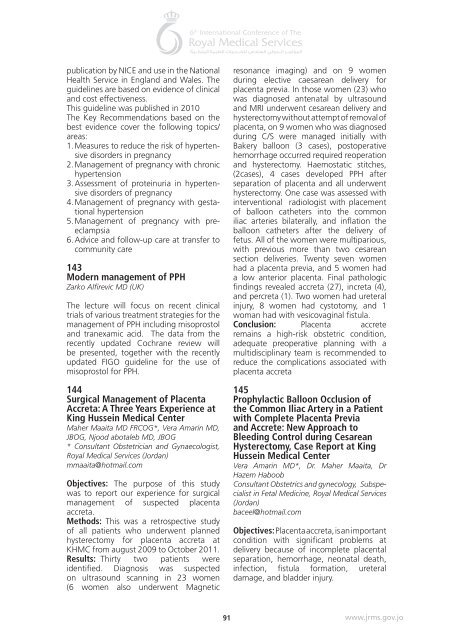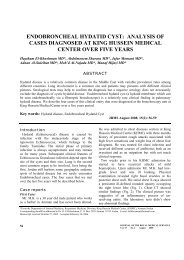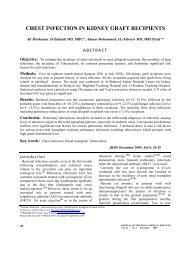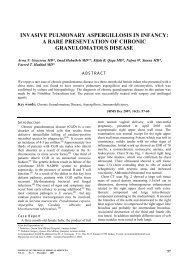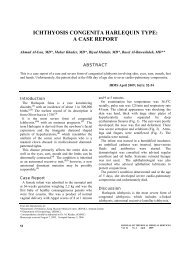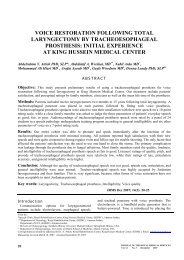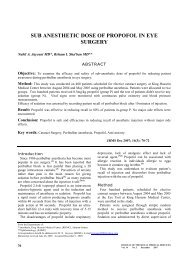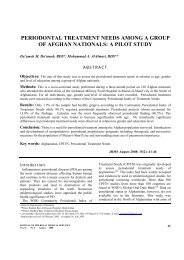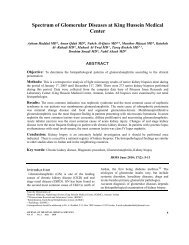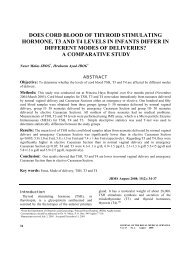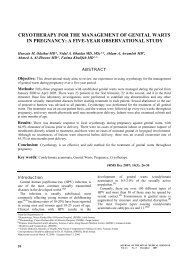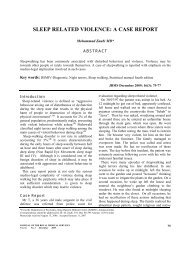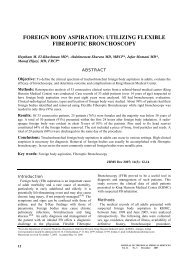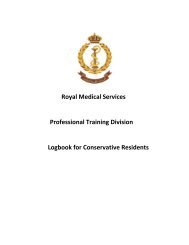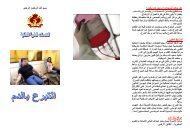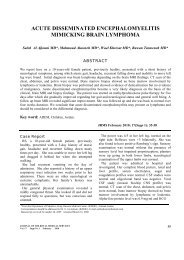Abstract book 6th RMS 16.indd
Abstract book 6th RMS 16.indd
Abstract book 6th RMS 16.indd
Create successful ePaper yourself
Turn your PDF publications into a flip-book with our unique Google optimized e-Paper software.
publication by NICE and use in the National<br />
Health Service in England and Wales. The<br />
guidelines are based on evidence of clinical<br />
and cost effectiveness.<br />
This guideline was published in 2010<br />
The Key Recommendations based on the<br />
best evidence cover the following topics/<br />
areas:<br />
1. Measures to reduce the risk of hypertensive<br />
disorders in pregnancy<br />
2. Management of pregnancy with chronic<br />
hypertension<br />
3. Assessment of proteinuria in hypertensive<br />
disorders of pregnancy<br />
4. Management of pregnancy with gestational<br />
hypertension<br />
5. Management of pregnancy with preeclampsia<br />
6. Advice and follow-up care at transfer to<br />
community care<br />
143<br />
Modern management of PPH<br />
Zarko Alfirevic MD (UK)<br />
The lecture will focus on recent clinical<br />
trials of various treatment strategies for the<br />
management of PPH including misoprostol<br />
and tranexamic acid. The data from the<br />
recently updated Cochrane review will<br />
be presented, together with the recently<br />
updated FIGO guideline for the use of<br />
misoprostol for PPH.<br />
144<br />
Surgical Management of Placenta<br />
Accreta: A Three Years Experience at<br />
King Hussein Medical Center<br />
Maher Maaita MD FRCOG*, Vera Amarin MD,<br />
JBOG, Njood abotaleb MD, JBOG<br />
* Consultant Obstetrician and Gynaecologist,<br />
Royal Medical Services (Jordan)<br />
mmaaita@hotmail.com<br />
Objectives: The purpose of this study<br />
was to report our experience for surgical<br />
management of suspected placenta<br />
accreta.<br />
Methods: This was a retrospective study<br />
of all patients who underwent planned<br />
hysterectomy for placenta accreta at<br />
KHMC from august 2009 to October 2011.<br />
Results: Thirty two patients were<br />
identified. Diagnosis was suspected<br />
on ultrasound scanning in 23 women<br />
(6 women also underwent Magnetic<br />
resonance imaging) and on 9 women<br />
during elective caesarean delivery for<br />
placenta previa. In those women (23) who<br />
was diagnosed antenatal by ultrasound<br />
and MRI underwent cesarean delivery and<br />
hysterectomy without attempt of removal of<br />
placenta, on 9 women who was diagnosed<br />
during C/S were managed initially with<br />
Bakery balloon (3 cases), postoperative<br />
hemorrhage occurred required reoperation<br />
and hysterectomy. Haemostatic stitches,<br />
(2cases), 4 cases developed PPH after<br />
separation of placenta and all underwent<br />
hysterectomy. One case was assessed with<br />
interventional radiologist with placement<br />
of balloon catheters into the common<br />
iliac arteries bilaterally, and inflation the<br />
balloon catheters after the delivery of<br />
fetus. All of the women were multiparious,<br />
with previous more than two cesarean<br />
section deliveries. Twenty seven women<br />
had a placenta previa, and 5 women had<br />
a low anterior placenta. Final pathologic<br />
findings revealed accreta (27), increta (4),<br />
and percreta (1). Two women had ureteral<br />
injury, 8 women had cystotomy, and 1<br />
woman had with vesicovaginal fistula.<br />
Conclusion: Placenta accrete<br />
remains a high-risk obstetric condition,<br />
adequate preoperative planning with a<br />
multidisciplinary team is recommended to<br />
reduce the complications associated with<br />
placenta accreta<br />
145<br />
Prophylactic Balloon Occlusion of<br />
the Common Iliac Artery in a Patient<br />
with Complete Placenta Previa<br />
and Accrete: New Approach to<br />
Bleeding Control during Cesarean<br />
Hysterectomy, Case Report at King<br />
Hussein Medical Center<br />
Vera Amarin MD*, Dr. Maher Maaita, Dr<br />
Hazem Haboob<br />
Consultant Obstetrics and gynecology, Subspecialist<br />
in Fetal Medicine, Royal Medical Services<br />
(Jordan)<br />
baceel@hotmail.com<br />
Objectives: Placenta accreta, is an important<br />
condition with significant problems at<br />
delivery because of incomplete placental<br />
separation, hemorrhage, neonatal death,<br />
infection, fistula formation, ureteral<br />
damage, and bladder injury.<br />
91 www.jrms.gov.jo


